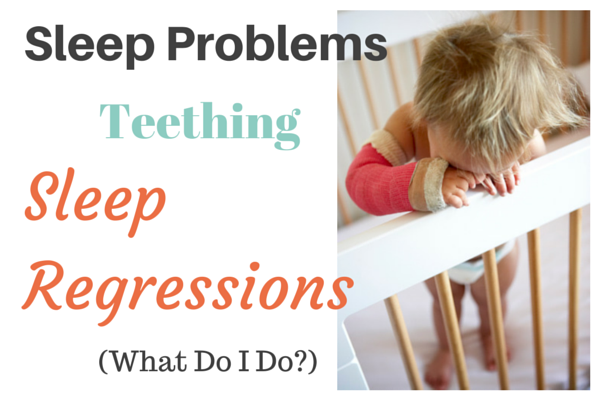If you’re one of the lucky few parents who have an almost mythological perfect angel baby who seems to love sleep no matter what’s going on in their little world, you don’t need to keep reading.
For everyone else – if your baby suddenly isn’t sleeping as much or is waking up and not going back to sleep, there’s a reason – sleep regressions – and I can help.
Sign Up For Our Newsletter
A sleep regression may be unavoidable for your baby no matter how good a sleeper he is and there are 4 common reasons why sudden night wakings and nap strikes hit.
Teething
Teething doesn’t tend to disrupt sleep as much as we think it does. Sure, it can be the go-to excuse that we like to use because what other explanation could there be, right? Chances are you need to take a look at the basic sleep fundamentals and determine if they’re being practiced. This is most likely what needs to be addressed instead.
However – I’m not saying teething doesn’t cause some discomfort. If your child is showing symptoms of teething and is clearly uncomfortable, by all means, do what works for you and your family best. You can try giving them a little bit of pain reliever before they go to bed or throw a small washcloth dipped in chamomile tea into the freezer. Having your baby chew on that can bring great soothing relief. If you have to provide some middle- of-the-night comfort, make sure once the teething stops you get right back to normal so your positive sleep routine stays intact.
Illness
If your child is really sick, extremely congested, has a fever, or is just down right not feeling well, then do what you have to do to get them through the night. If that means extra cuddles, sleeping in your arms, and some extra nursing sessions – go for it. I do it with my own kids! The key is that as soon as they start feeling better, you get right back to your usual routine and soothing method. If not, suddenly you can be stuck in a sleepless cycle and wondering how you got there. Remember – consistency is key. So as soon as you feel like your little one is better, go back to the same routine as they had before the illness.
Developmental Milestones
It’s not fair that we call some milestones regressions because this is an amazing time for our little ones. They’re learning fantastic new skills, like flipping over, crawling, talking, pulling themselves up and walking. But unfortunately the skill of staying asleep may be put on the back burner while they are busy thinking and practicing.
It’s important to understand that now isn’t the time to start changing things up at night. Your little one doesn’t need to be rocked to sleep or nursed to sleep because naps are suddenly disrupted or night-wakings have suddenly appeared. They may need time to figure out this new amazing development – it may last a week or two – but sleep will become the priority again.
Age
If your baby isn’t teething, sick or going through a developmental milestone – it could be one of the common sleep regressions that happen at 4 months, 8-10 months and 18 months. Here’s more on why they’re disrupting your child’s sleep and what to do about them:
The 8-10 Month Sleep Regression
All types of regressions will occur to even the best sleepers and it’s easy to go into “get through the night” mode. I completely get it. It’s important though to stay consistent with the norm and sleep will return.

Alanna McGinn is a Certified Infant and Toddler Sleep Consultant and Founder of Good Night Sleep Site – a Global Pediatric and Family Sleep Team. She provides free child and family sleep support through her Facebook, Twitter, and Instagram. She invites you to join her sleep community as she works towards Good Night Sleep Site’s mission of a healthier rested family unit. For more sleep tips please visit Good Night Sleep Site.











